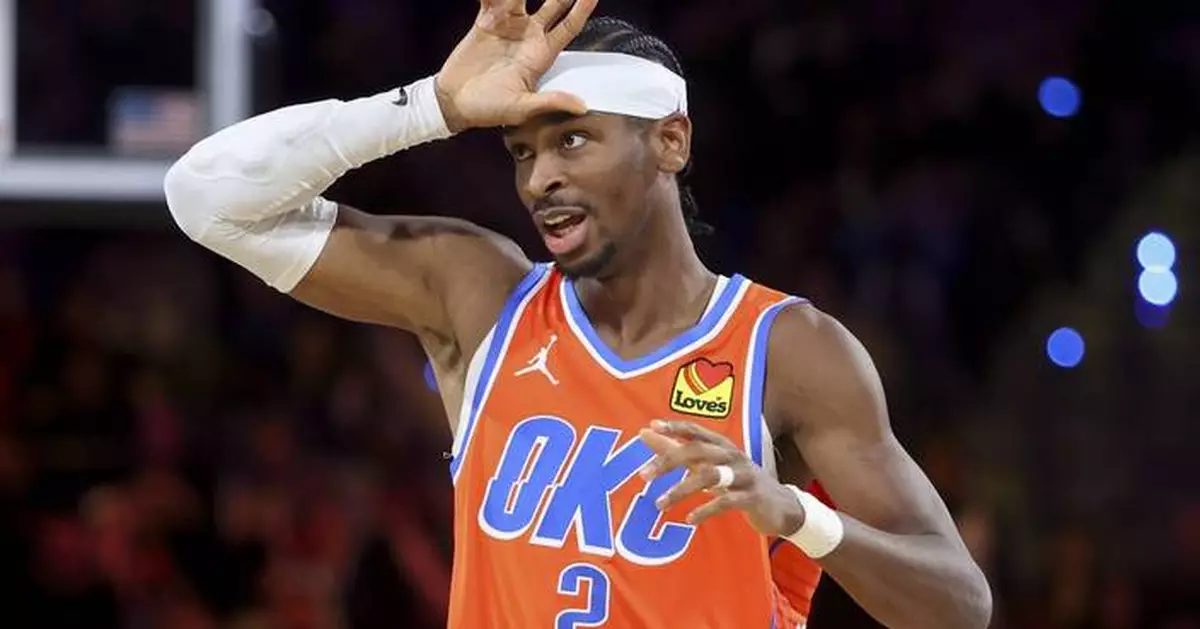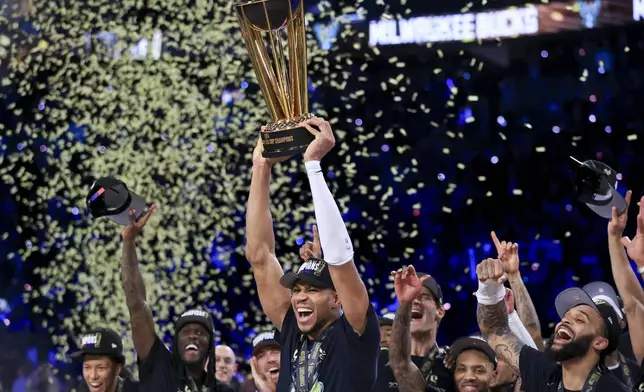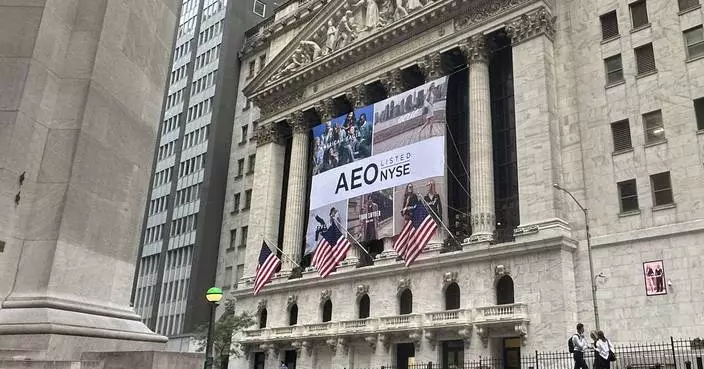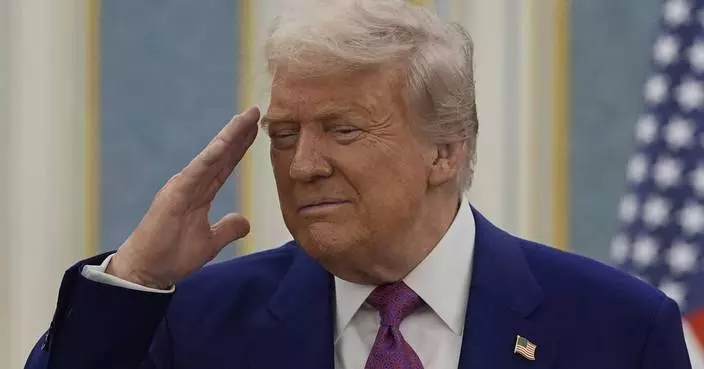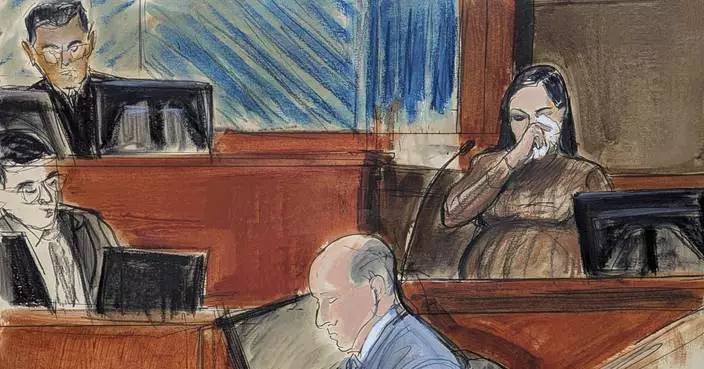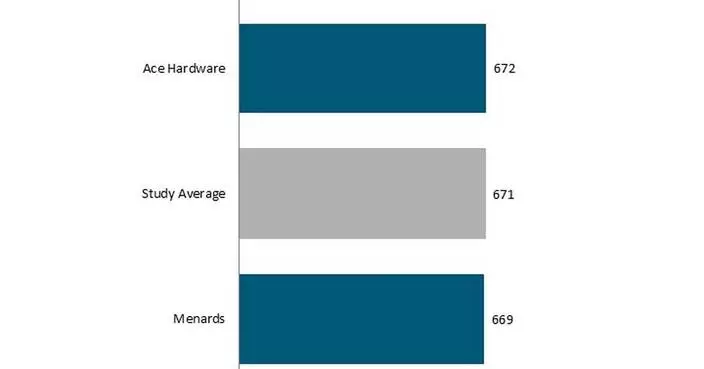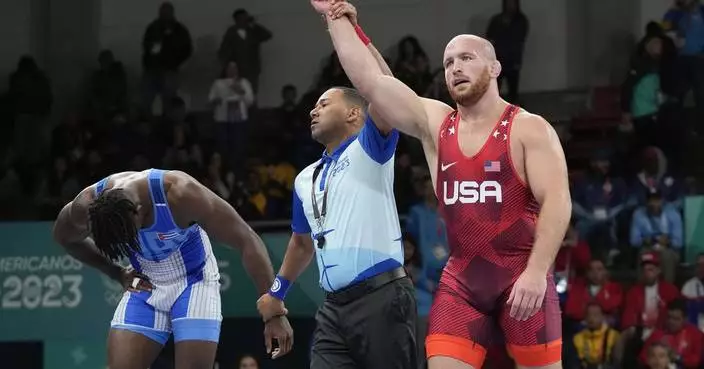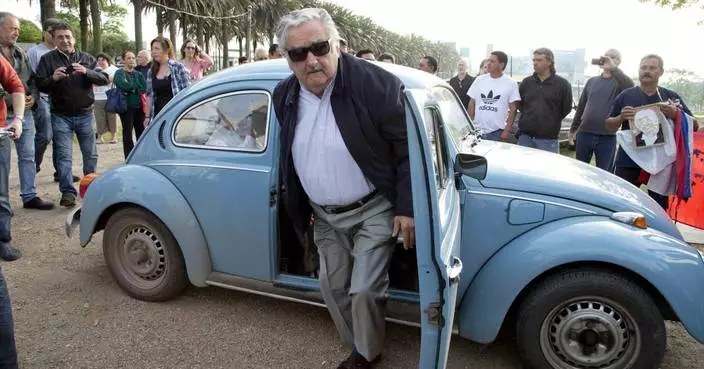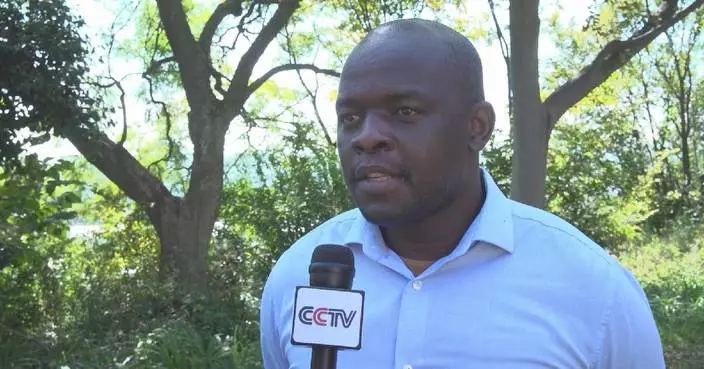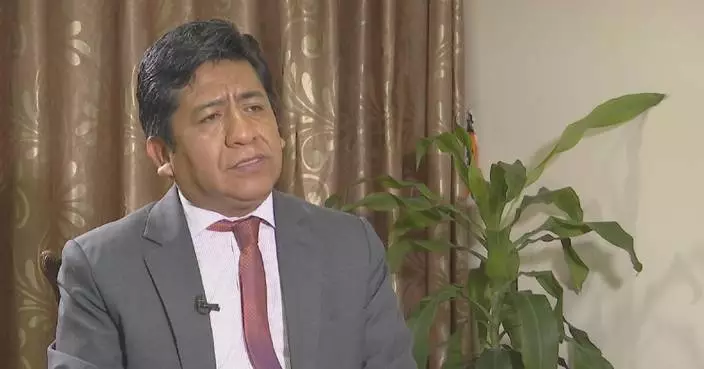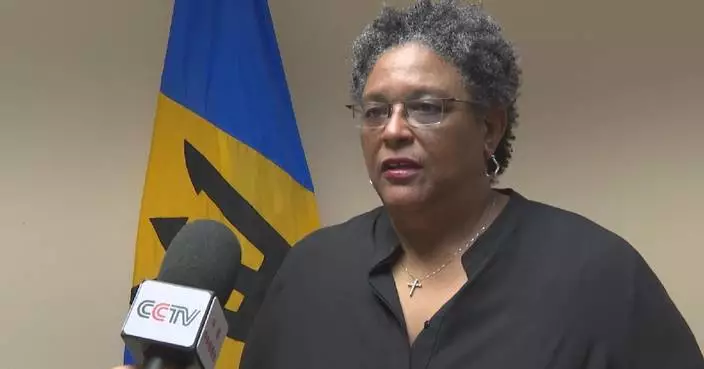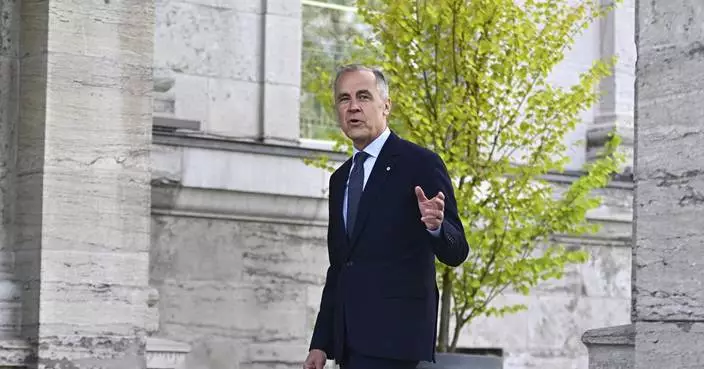LAS VEGAS (AP) — Everyone has a lucky number in Las Vegas. For the Milwaukee Bucks, it was 3.
And the NBA Cup was their prize.
Click to Gallery
Oklahoma City Thunder guard Cason Wallace (22) shoots against Milwaukee Bucks guard AJ Green (20) during the first half of the championship game in the NBA Cup basketball tournament Tuesday, Dec. 17, 2024, in Las Vegas. (AP Photo/Ian Maule)
Oklahoma City Thunder guard Shai Gilgeous-Alexander (2) during the first half of the championship game against the Milwaukee Bucks in the NBA Cup basketball tournament Tuesday, Dec. 17, 2024, in Las Vegas. (AP Photo/Ian Maule)
Milwaukee Bucks guard Damian Lillard (0) lifts up the NBA Cup while forward Giannis Antetokounmpo (34), left, and center Brook Lopez (11), right, celebrate after their team's victory in the championship game of the NBA Cup basketball tournament against the Oklahoma City Thunder Tuesday, Dec. 17, 2024, in Las Vegas. (AP Photo/Ian Maule)
Milwaukee Bucks forward Giannis Antetokounmpo (34), Milwaukee Bucks guard Damian Lillard (0), and Milwaukee Bucks center Brook Lopez (11) celebrate after their team's victory in the championship game of the NBA Cup basketball tournament against the Oklahoma City Thunder Tuesday, Dec. 17, 2024, in Las Vegas. (AP Photo/Ian Maule)
Milwaukee Bucks forwards Giannis Antetokounmpo (34) and Bobby Portis (9) hug after their team's victory in the championship game of the NBA Cup basketball tournament against the Oklahoma City Thunder Tuesday, Dec. 17, 2024, in Las Vegas. (AP Photo/Ian Maule)
Milwaukee Bucks forward Giannis Antetokounmpo (34) yells while lifting up the NBA Cup after his team's victory in the championship game of the NBA Cup basketball tournament against the Oklahoma City Thunder Tuesday, Dec. 17, 2024, in Las Vegas. (AP Photo/Ian Maule)
Milwaukee Bucks head coach Doc Rivers cheers after his team's victory in the championship game of the NBA Cup basketball tournament against the Oklahoma City Thunder Tuesday, Dec. 17, 2024, in Las Vegas. (AP Photo/Ian Maule)
Milwaukee Bucks forward Giannis Antetokounmpo (34) bites his NBA Cup medal after his team's victory in the championship game of the NBA Cup basketball tournament against the Oklahoma City Thunder Tuesday, Dec. 17, 2024, in Las Vegas. (AP Photo/Ian Maule)
Milwaukee Bucks forward Giannis Antetokounmpo (34) wrestles for a loose ball with Oklahoma City Thunder guard Cason Wallace (22) during the first half of the championship game in the NBA Cup basketball tournament Tuesday, Dec. 17, 2024, in Las Vegas. (AP Photo/Ian Maule)
Oklahoma City Thunder center Isaiah Hartenstein (55) shoots against Milwaukee Bucks center Brook Lopez (11) and forward Giannis Antetokounmpo (34) during the first half of the championship game in the NBA Cup basketball tournament Tuesday, Dec. 17, 2024, in Las Vegas. (AP Photo/Ian Maule)
Oklahoma City Thunder forward Jalen Williams (8) shoots against Milwaukee Bucks guard Gary Trent Jr. (5) during the first half of the championship game in the NBA Cup basketball tournament Tuesday, Dec. 17, 2024, in Las Vegas. (AP Photo/Ian Maule)
Oklahoma City Thunder center Isaiah Hartenstein (55) shoots against Milwaukee Bucks forward Bobby Portis (9) during the first half of the championship game in the NBA Cup basketball tournament Tuesday, Dec. 17, 2024, in Las Vegas. (AP Photo/Ian Maule)
Oklahoma City Thunder head coach Mark Daigneault yells during the first half of the championship game against the Milwaukee Bucks in the NBA Cup basketball tournament Tuesday, Dec. 17, 2024, in Las Vegas. (AP Photo/Ian Maule)
Milwaukee Bucks head coach Doc Rivers watches his team play during the first half of the championship game against the Oklahoma City Thunder in the NBA Cup basketball tournament Tuesday, Dec. 17, 2024, in Las Vegas. (AP Photo/Ian Maule)
Milwaukee Bucks forward Bobby Portis (9) celebrates after a three point basket during the first half of the championship game against the Oklahoma City Thunder in the NBA Cup basketball tournament Tuesday, Dec. 17, 2024, in Las Vegas. (AP Photo/Ian Maule)
Oklahoma City Thunder forward Jalen Williams (8) shoots against Milwaukee Bucks forward Giannis Antetokounmpo (34) and center Brook Lopez (11) during the first half of the championship game in the NBA Cup basketball tournament Tuesday, Dec. 17, 2024, in Las Vegas. (AP Photo/Ian Maule)
Milwaukee Bucks forward Giannis Antetokounmpo (34) shoots over Oklahoma City Thunder center Isaiah Hartenstein (55) during the first half of the championship game in the NBA Cup basketball tournament Tuesday, Dec. 17, 2024, in Las Vegas. (AP Photo/Ian Maule)
Oklahoma City Thunder guard Shai Gilgeous-Alexander (2) shoots against Milwaukee Bucks forward Giannis Antetokounmpo (34) during the first half of the championship game in the NBA Cup basketball tournament Tuesday, Dec. 17, 2024, in Las Vegas. (AP Photo/Ian Maule)
Milwaukee Bucks forward Giannis Antetokounmpo (34) celebrates after making a basket during the first half of a semifinal game against the Atlanta Hawks in the NBA Cup basketball tournament Saturday, Dec. 14, 2024, in Las Vegas. (AP Photo/Ian Maule)
Oklahoma City Thunder guard Shai Gilgeous-Alexander celebrates during the second half of a semifinal game against the Houston Rockets in the NBA Cup basketball tournament Saturday, Dec. 14, 2024, in Las Vegas. (AP Photo/Ian Maule)
Tournament MVP Giannis Antetokounmpo scored 26 points to go along with 19 rebounds and 10 assists, Damian Lillard added 23 points and the Bucks connected on 17 3-pointers on the way to beating the Oklahoma City Thunder 97-81 in the NBA Cup title game on Tuesday night.
“Everybody did their job," Lillard said. “We defended. We played well from the start of the game all the way through the finish. I think it just showed what we've been building. I think it all came out in our biggest game to this point.”
Brook Lopez and Gary Trent Jr. each scored 13 for the Bucks, who joined the Los Angeles Lakers as the only champions of the 2-year-old event. A 19-5 Milwaukee run in the second half turned what was a five-point game into a 19-point game early in the fourth, and the Bucks kept control the rest of the way.
“It's great, it's great for our team,” Antetokounmpo said. “We're getting better. ... We know we're leaving Vegas as a better team. I'm so proud of this group. Man, I'm so proud of this group.”
Shai Gilgeous-Alexander scored 21 and Jalen Williams added 18 for the Thunder, who had scored at least 99 points in every game this season. But they sputtered in plenty of ways Tuesday, getting outscored 51-15 from beyond the arc and shooting only 34%.
“We didn't shoot it well,” Gilgeous-Alexander said. “But that's never an excuse. ... We've shot bad and won games before, so that's not an excuse.”
Isaiah Hartenstein had 16 points and 12 rebounds for Oklahoma City, which was held to 31 points after halftime.
“We did some good things. We outscored them in the paint so obviously we did the job defensively on that end,” Thunder coach Mark Daigneault said. “But obviously a tough night offensively all the way around for us. We didn't score nearly enough points, especially in the second half, to give ourselves a chance to win. But we can learn from it, move forward here.”
It’s a game that only counted for tournament purposes. There was about $300,000 in additional bonus money for Bucks players — they got $514,971 apiece, while the Thunder players got $205,988 each — but the win, the loss and the statistics from the game won’t count toward the regular season.
Mired toward the bottom of the NBA after a 2-8 start, the Bucks have been on a tear since. This was their 13th win in their last 16 games, even though it won't be part of the official record.
No matter: When the Bucks emptied their bench with 1:37 left, Antetokounmpo pumped his fists like it was a true championship moment.
He's won bigger games — he and the Bucks captured the 2021 NBA title, after all. But they said from the outset of this tournament that the NBA Cup was a priority.
And they left no doubt in the end.
“We struggled coming out of the gates,” Bucks coach Doc Rivers said. “No one here doubted what we can be and who we can be and we just hung in there. We stuck together and this is the byproduct of a team sticking together. But we still have work to do.”
Antetokounmpo was even more succinct: “Job's not done,” he said.
His point was clear: There's another title to chase in June. But this was still a trophy moment to celebrate.
Bucks: Milwaukee played without guard Khris Middleton (non-COVID illness) and still improved to an NBA-best 12-1 in NBA Cup games, including a perfect 7-0 this season. The Bucks' only in-season tournament loss was to Indiana in last year's semifinals.
Thunder: It was a rare night of playing uphill for Oklahoma City, which trailed by as many as 20. The Thunder trailed by more than 14 points in only two of their 25 games so far in the regular season — getting down by 30 against Golden State and by 21 to San Antonio.
No fewer than five players ended up on the floor, all scrapping for a loose ball with 9:12 left in the third quarter. Thunder forward Lu Dort was hit with a technical, Daigneault got another a few seconds later and Lillard ended up with a five-point possession — two free throws for the techs, followed by a 3-pointer.
The Thunder are 20-1 this season when leading after three quarters. They're now 0-5 when tied or trailing going into the final quarter (even though it will officially be 0-4 since this game won't be counted).
The Thunder visit Orlando on Thursday and Miami on Friday. The Bucks visit Cleveland on Friday and host Washington on Saturday.
AP NBA: https://apnews.com/hub/NBA
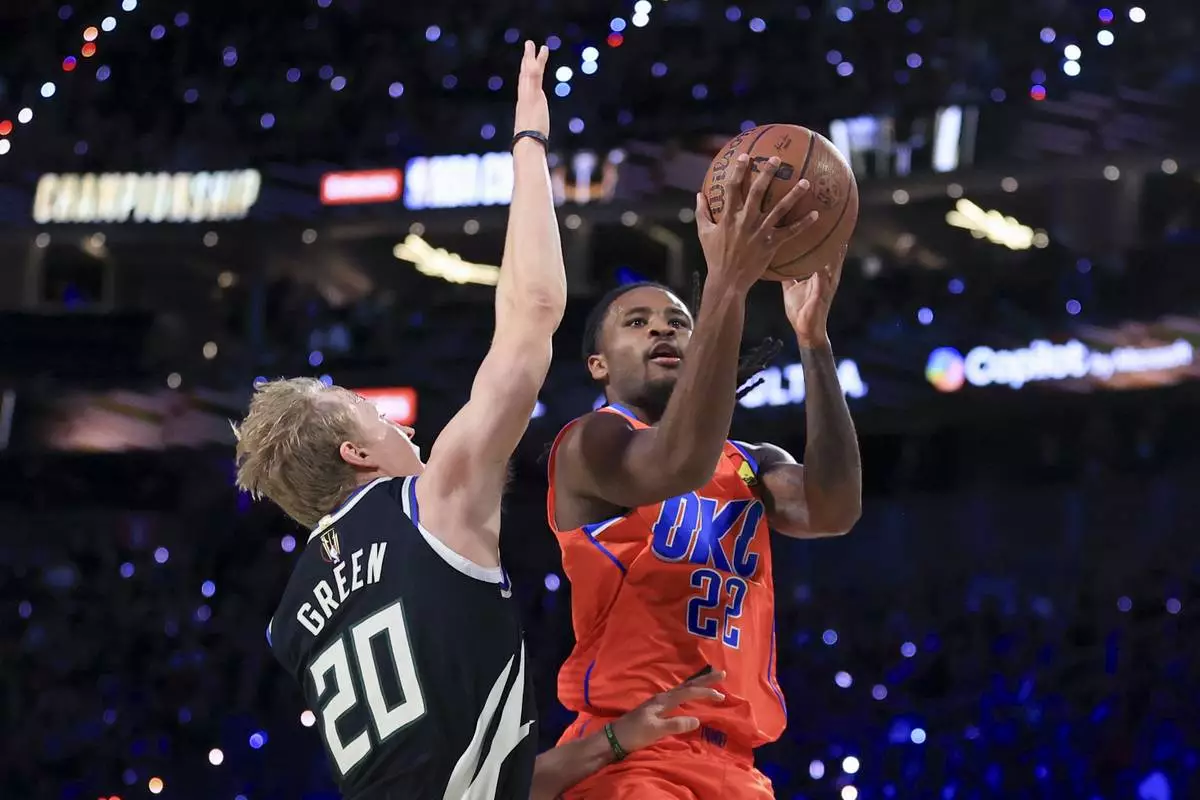
Oklahoma City Thunder guard Cason Wallace (22) shoots against Milwaukee Bucks guard AJ Green (20) during the first half of the championship game in the NBA Cup basketball tournament Tuesday, Dec. 17, 2024, in Las Vegas. (AP Photo/Ian Maule)
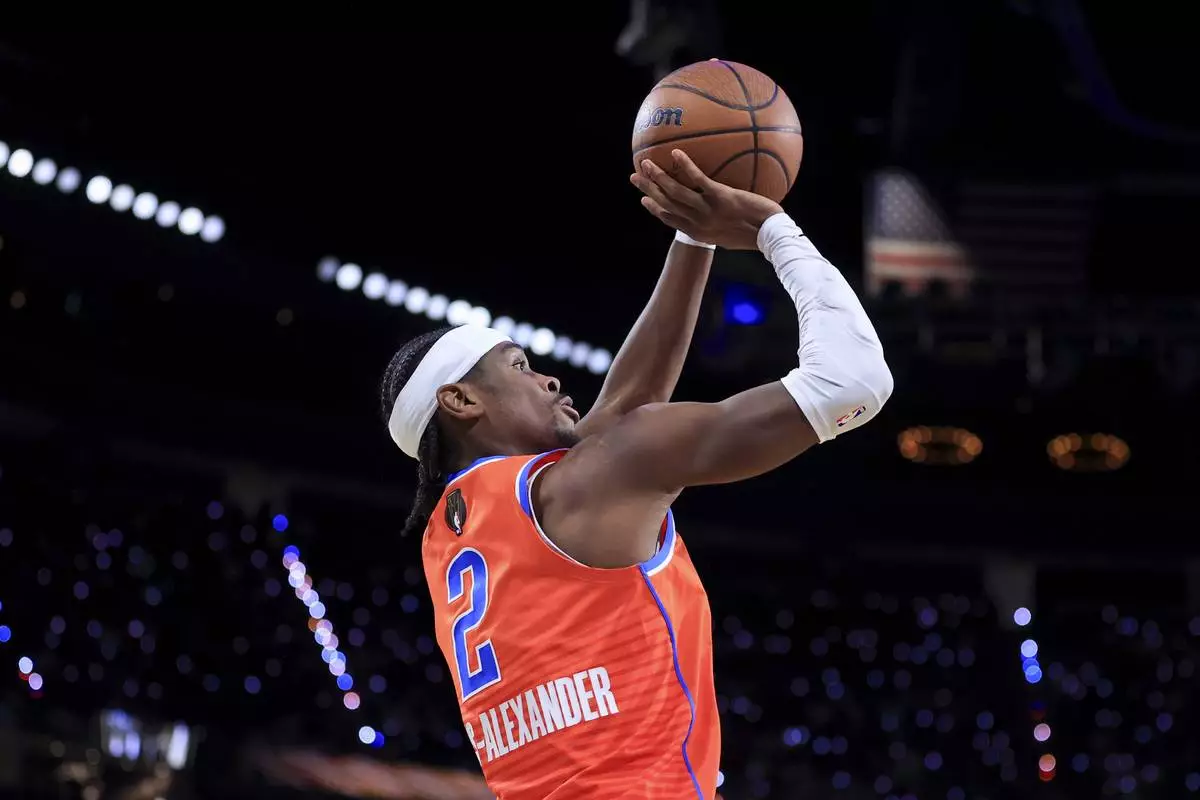
Oklahoma City Thunder guard Shai Gilgeous-Alexander (2) during the first half of the championship game against the Milwaukee Bucks in the NBA Cup basketball tournament Tuesday, Dec. 17, 2024, in Las Vegas. (AP Photo/Ian Maule)
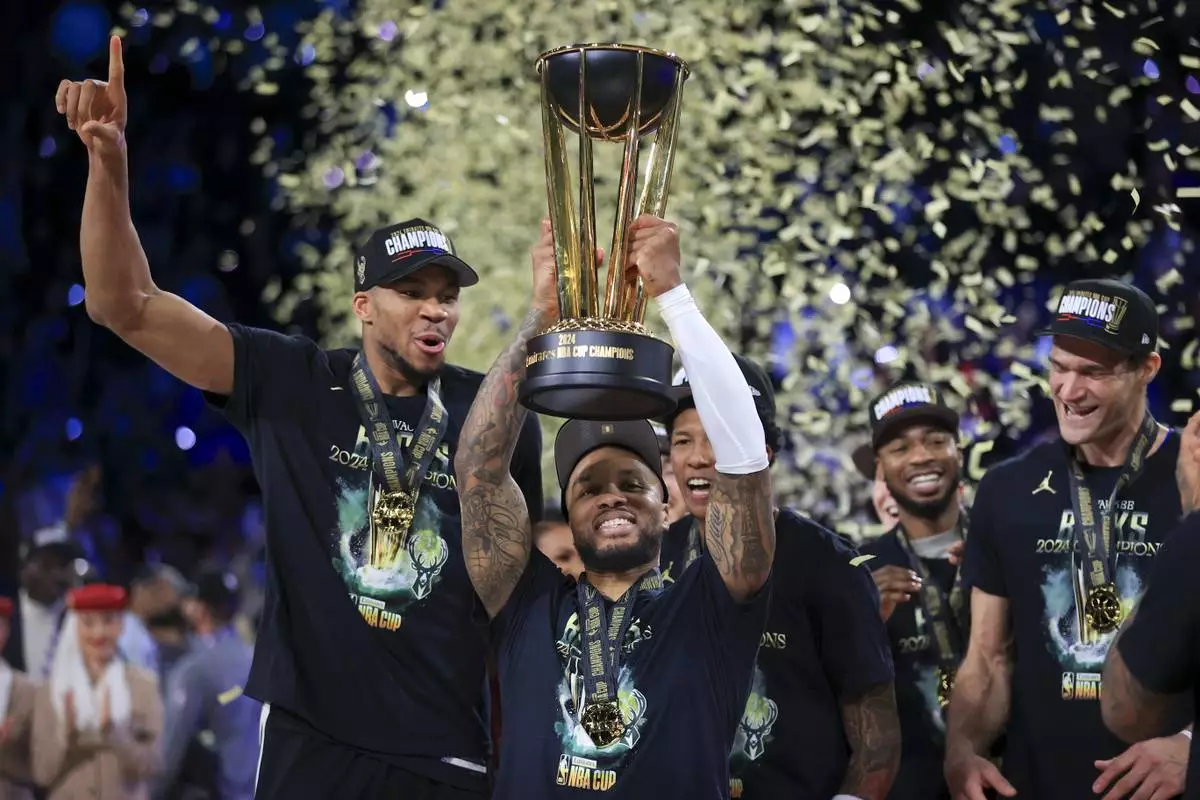
Milwaukee Bucks guard Damian Lillard (0) lifts up the NBA Cup while forward Giannis Antetokounmpo (34), left, and center Brook Lopez (11), right, celebrate after their team's victory in the championship game of the NBA Cup basketball tournament against the Oklahoma City Thunder Tuesday, Dec. 17, 2024, in Las Vegas. (AP Photo/Ian Maule)
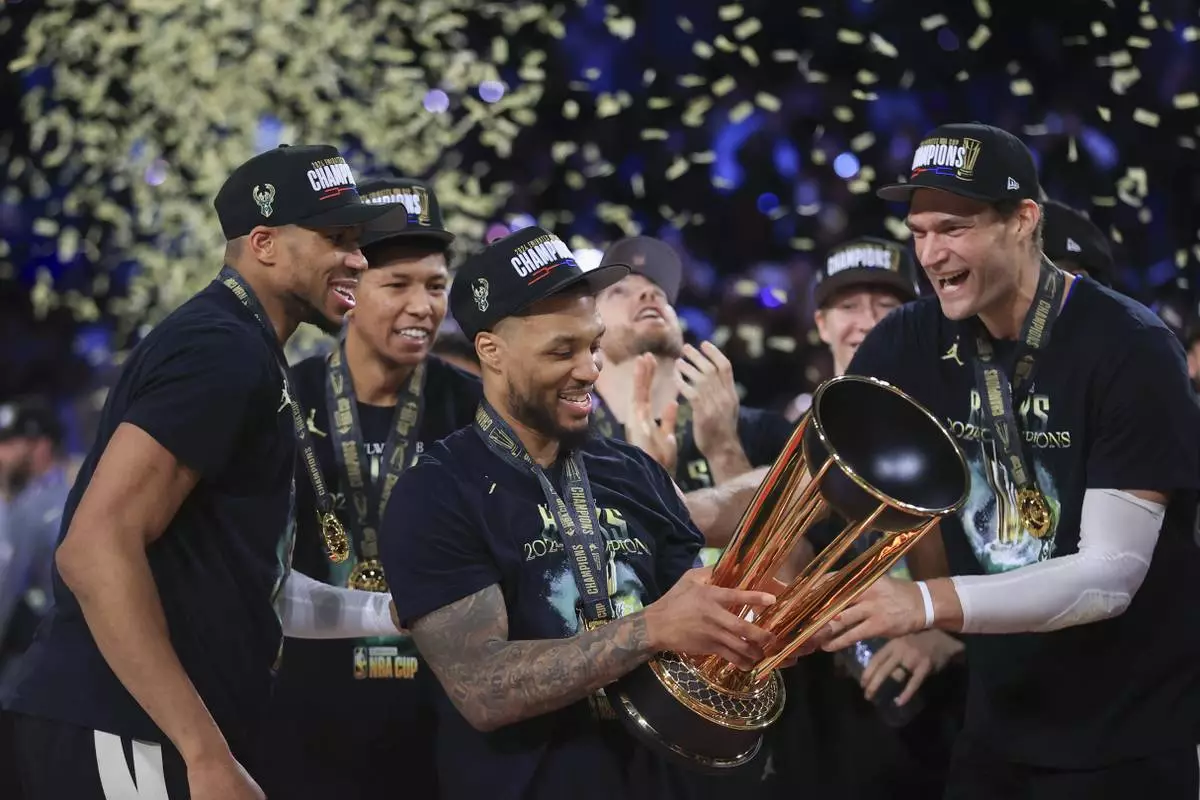
Milwaukee Bucks forward Giannis Antetokounmpo (34), Milwaukee Bucks guard Damian Lillard (0), and Milwaukee Bucks center Brook Lopez (11) celebrate after their team's victory in the championship game of the NBA Cup basketball tournament against the Oklahoma City Thunder Tuesday, Dec. 17, 2024, in Las Vegas. (AP Photo/Ian Maule)
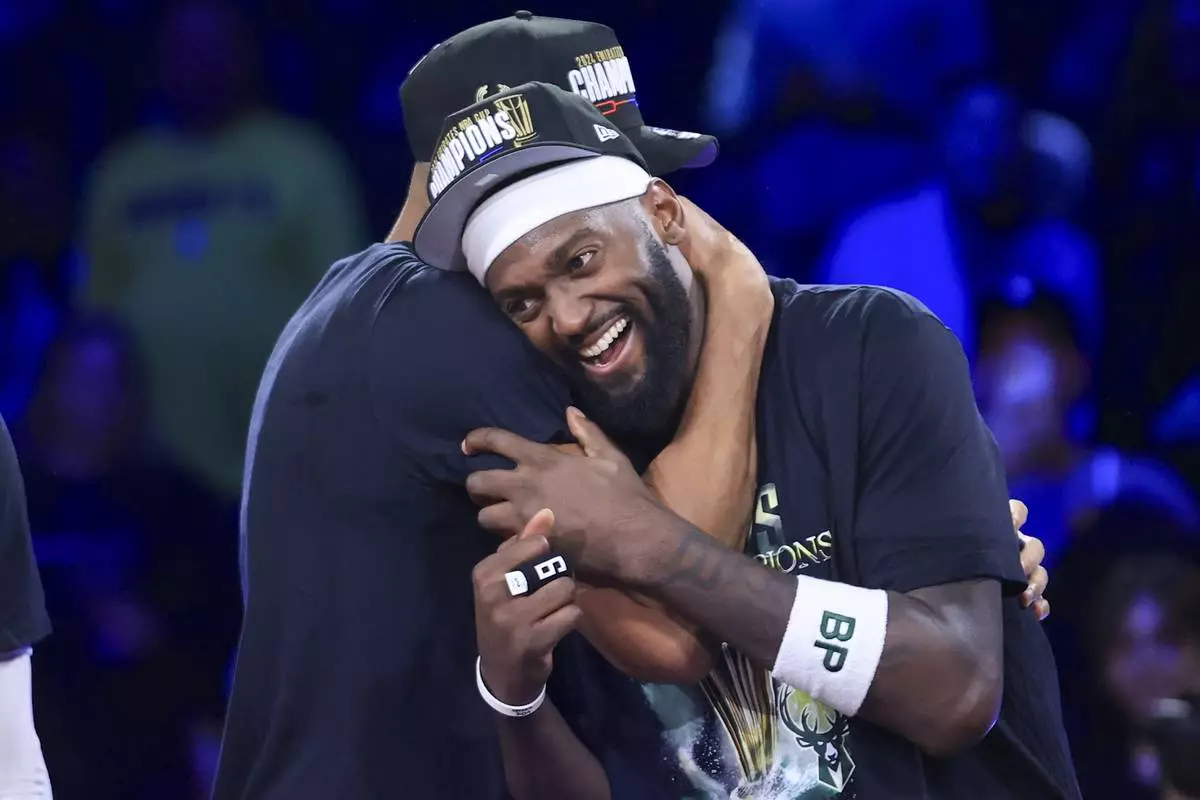
Milwaukee Bucks forwards Giannis Antetokounmpo (34) and Bobby Portis (9) hug after their team's victory in the championship game of the NBA Cup basketball tournament against the Oklahoma City Thunder Tuesday, Dec. 17, 2024, in Las Vegas. (AP Photo/Ian Maule)

Milwaukee Bucks forward Giannis Antetokounmpo (34) yells while lifting up the NBA Cup after his team's victory in the championship game of the NBA Cup basketball tournament against the Oklahoma City Thunder Tuesday, Dec. 17, 2024, in Las Vegas. (AP Photo/Ian Maule)
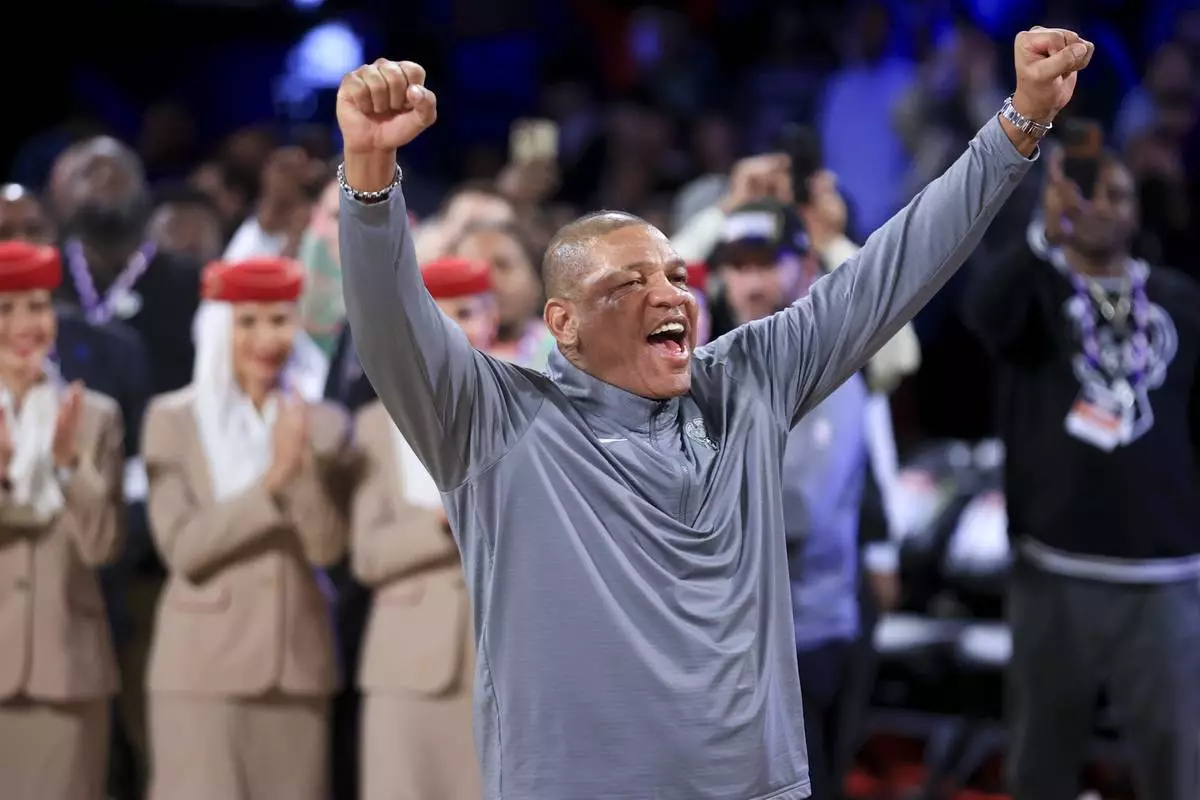
Milwaukee Bucks head coach Doc Rivers cheers after his team's victory in the championship game of the NBA Cup basketball tournament against the Oklahoma City Thunder Tuesday, Dec. 17, 2024, in Las Vegas. (AP Photo/Ian Maule)
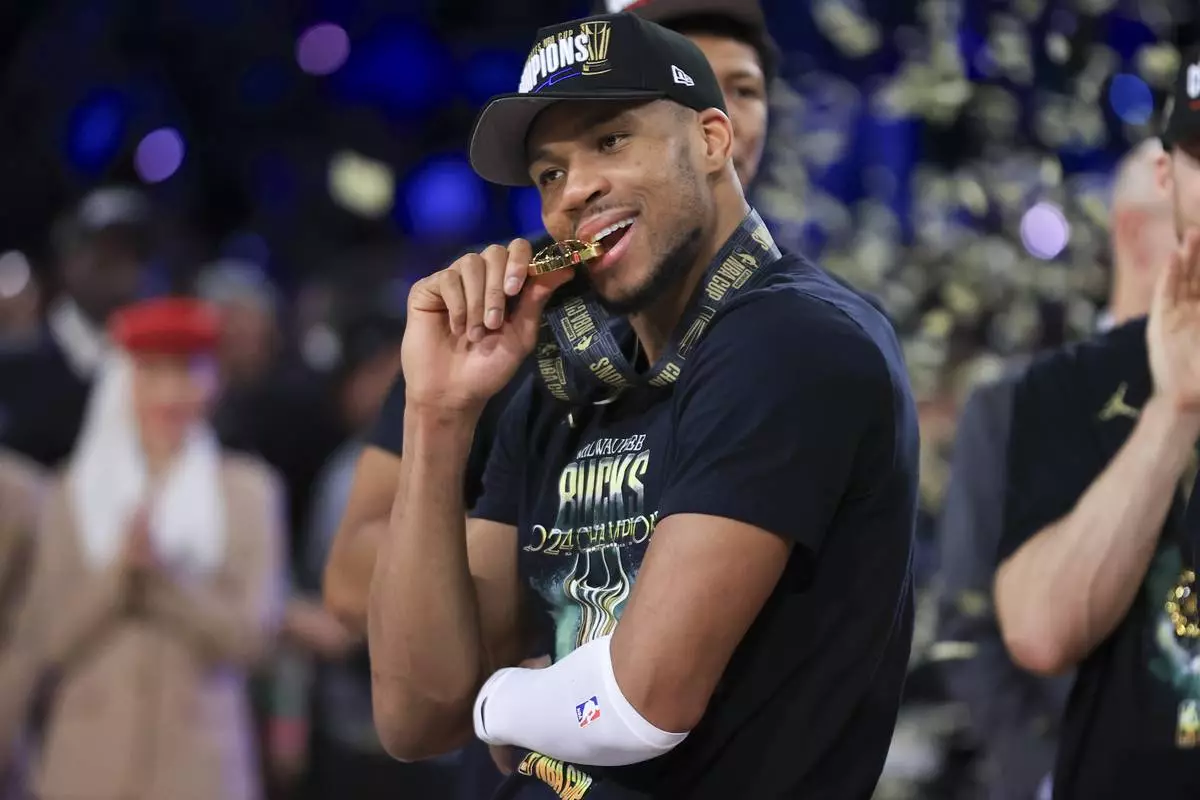
Milwaukee Bucks forward Giannis Antetokounmpo (34) bites his NBA Cup medal after his team's victory in the championship game of the NBA Cup basketball tournament against the Oklahoma City Thunder Tuesday, Dec. 17, 2024, in Las Vegas. (AP Photo/Ian Maule)
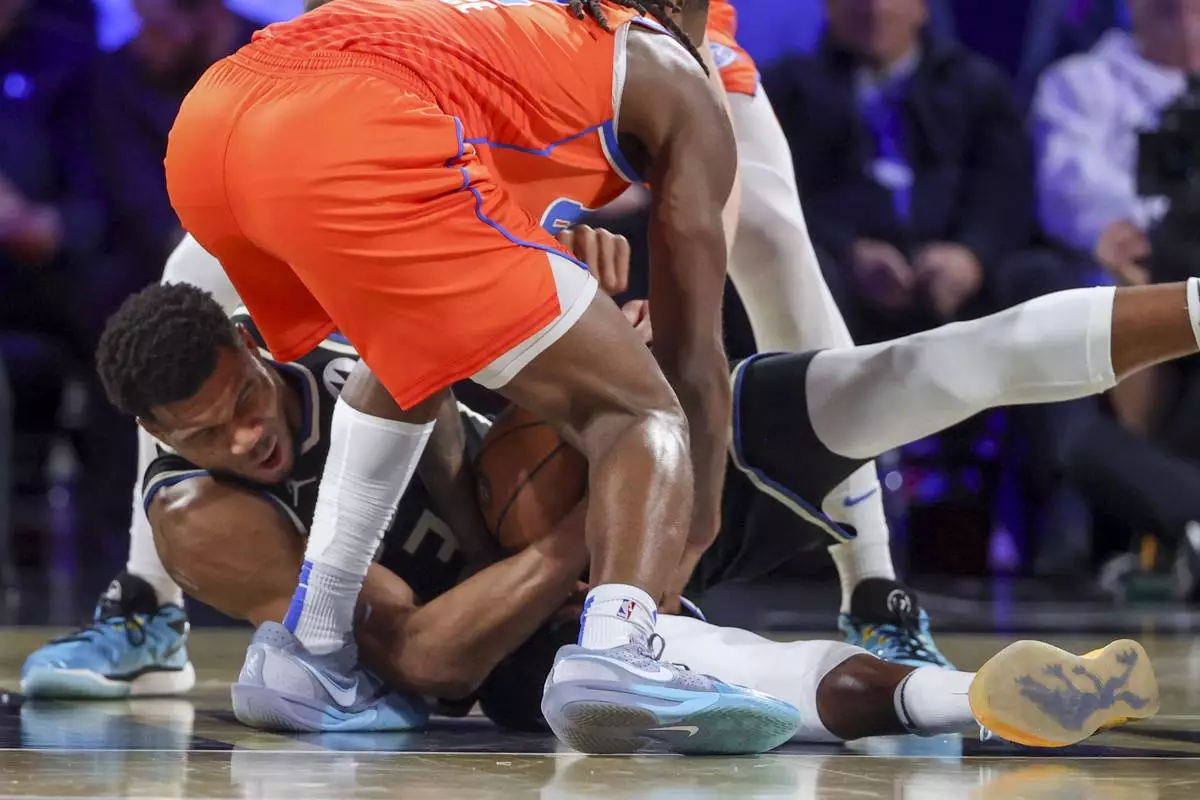
Milwaukee Bucks forward Giannis Antetokounmpo (34) wrestles for a loose ball with Oklahoma City Thunder guard Cason Wallace (22) during the first half of the championship game in the NBA Cup basketball tournament Tuesday, Dec. 17, 2024, in Las Vegas. (AP Photo/Ian Maule)
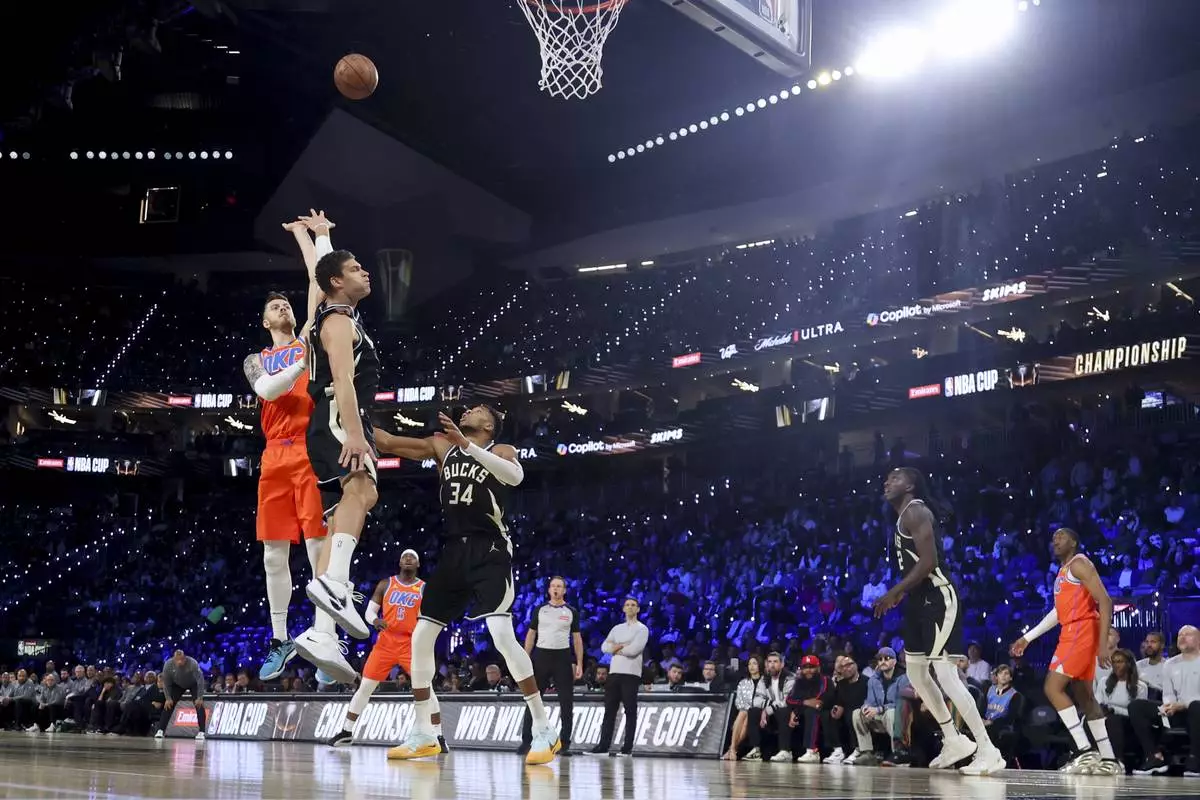
Oklahoma City Thunder center Isaiah Hartenstein (55) shoots against Milwaukee Bucks center Brook Lopez (11) and forward Giannis Antetokounmpo (34) during the first half of the championship game in the NBA Cup basketball tournament Tuesday, Dec. 17, 2024, in Las Vegas. (AP Photo/Ian Maule)
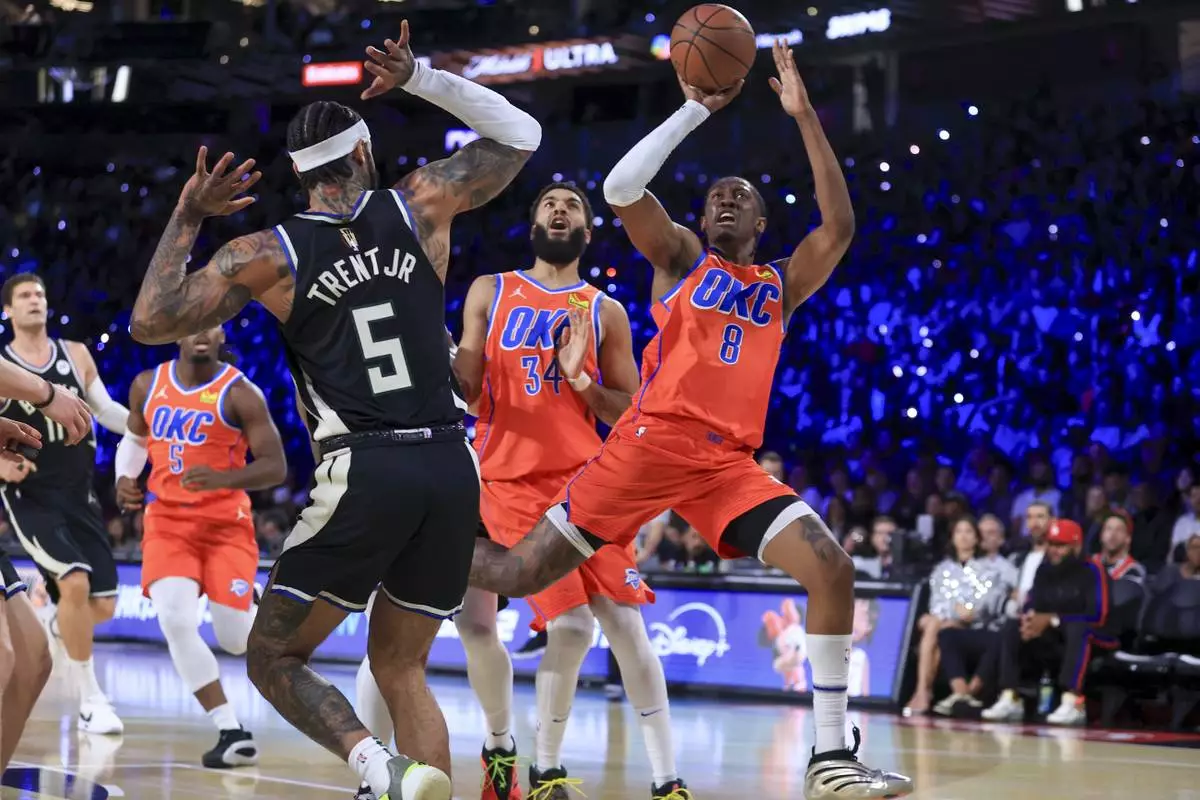
Oklahoma City Thunder forward Jalen Williams (8) shoots against Milwaukee Bucks guard Gary Trent Jr. (5) during the first half of the championship game in the NBA Cup basketball tournament Tuesday, Dec. 17, 2024, in Las Vegas. (AP Photo/Ian Maule)
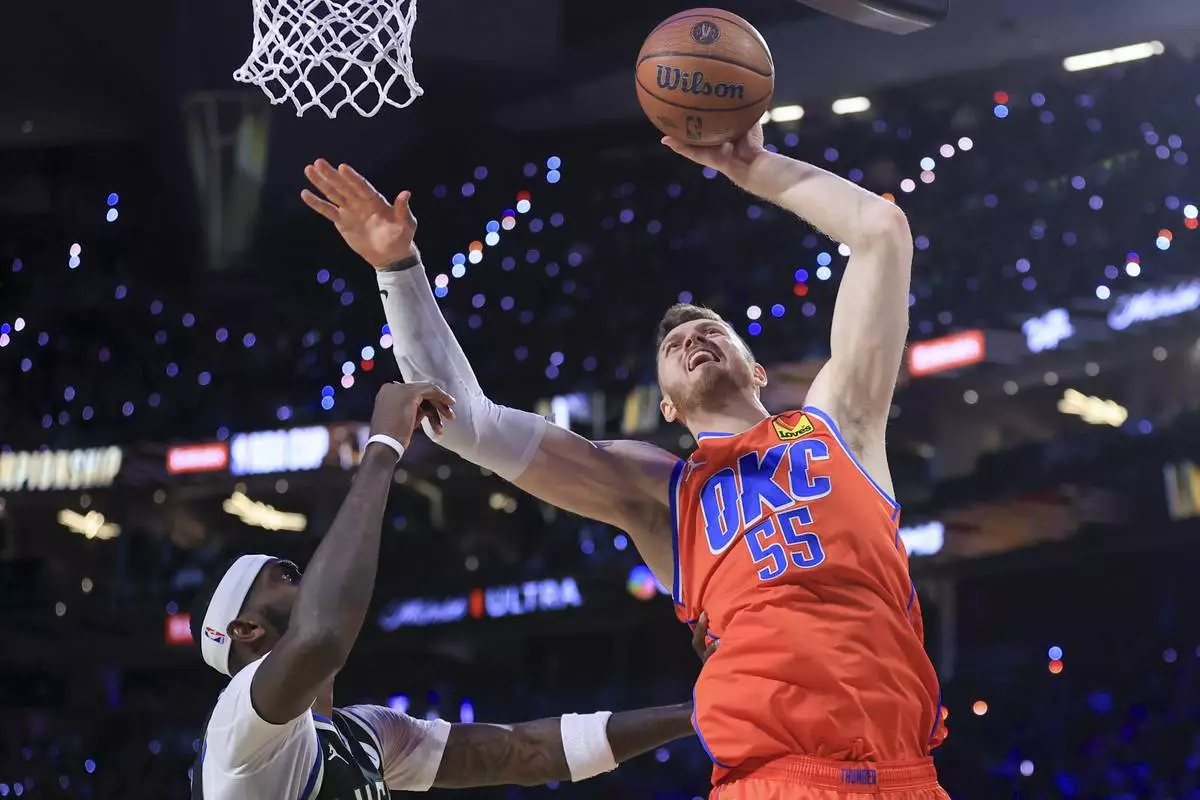
Oklahoma City Thunder center Isaiah Hartenstein (55) shoots against Milwaukee Bucks forward Bobby Portis (9) during the first half of the championship game in the NBA Cup basketball tournament Tuesday, Dec. 17, 2024, in Las Vegas. (AP Photo/Ian Maule)
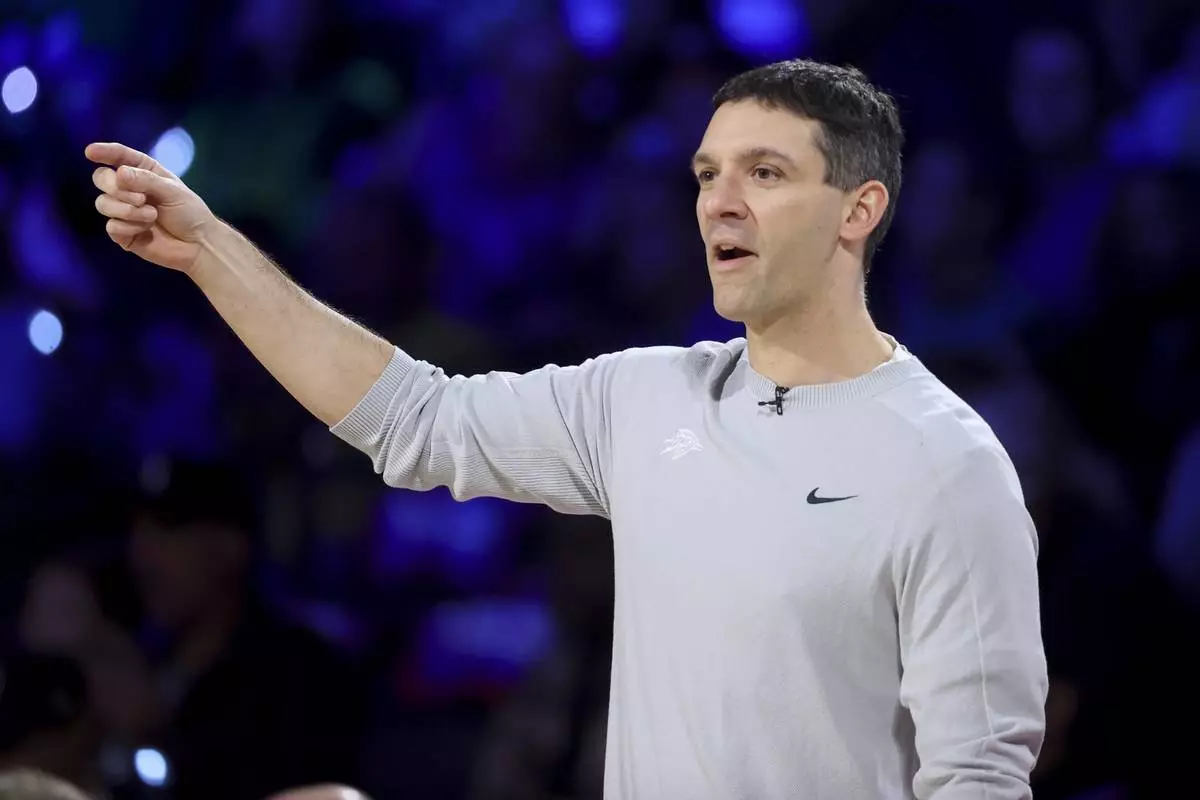
Oklahoma City Thunder head coach Mark Daigneault yells during the first half of the championship game against the Milwaukee Bucks in the NBA Cup basketball tournament Tuesday, Dec. 17, 2024, in Las Vegas. (AP Photo/Ian Maule)
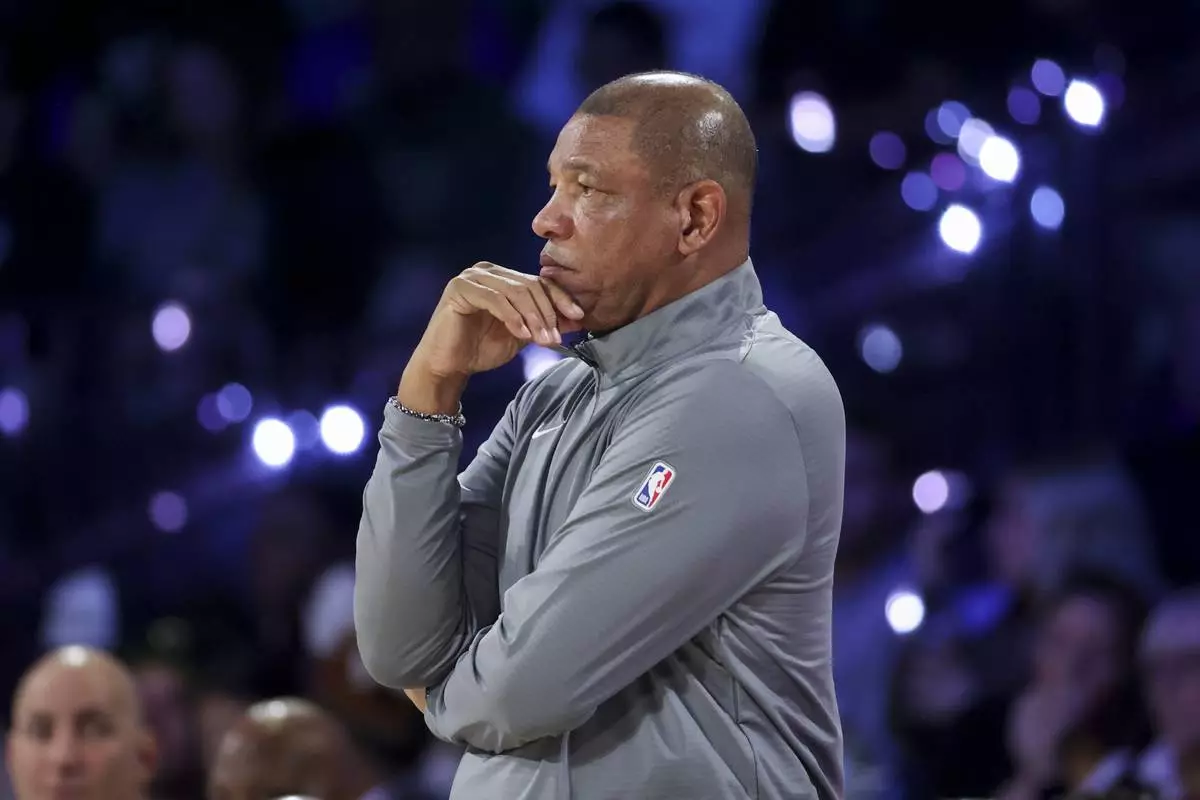
Milwaukee Bucks head coach Doc Rivers watches his team play during the first half of the championship game against the Oklahoma City Thunder in the NBA Cup basketball tournament Tuesday, Dec. 17, 2024, in Las Vegas. (AP Photo/Ian Maule)
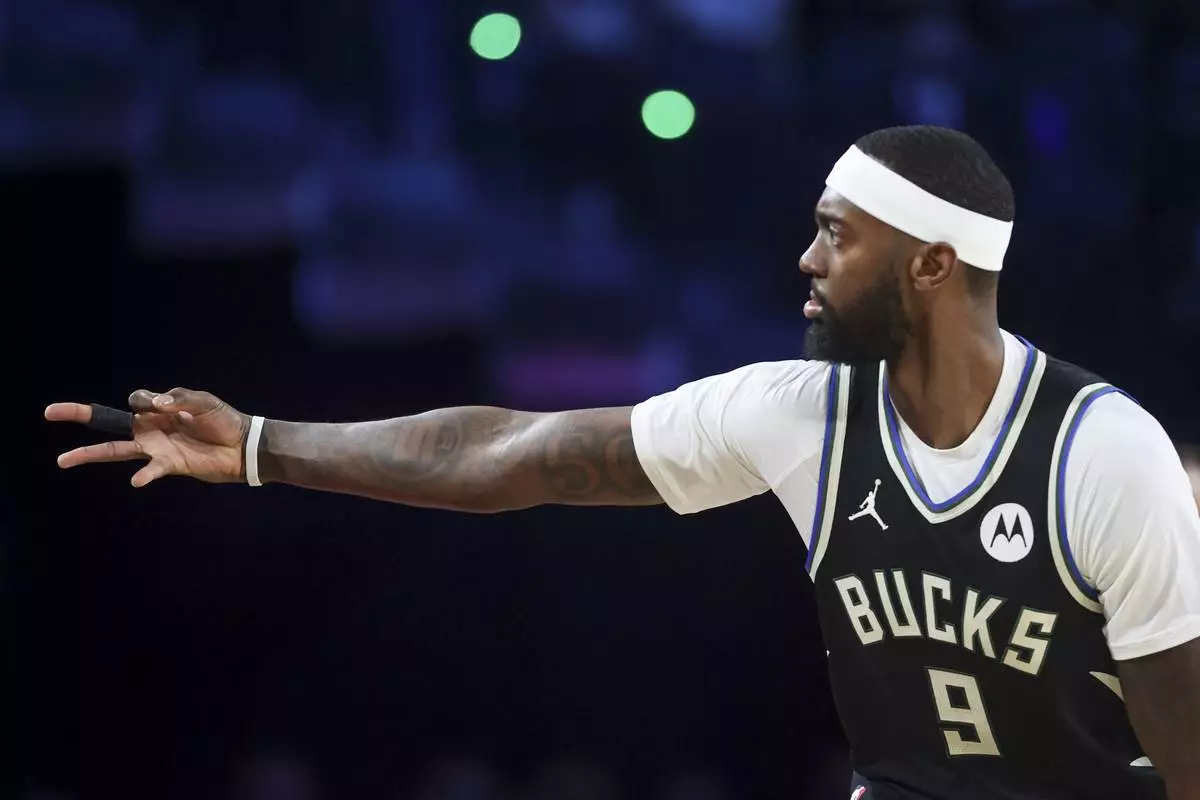
Milwaukee Bucks forward Bobby Portis (9) celebrates after a three point basket during the first half of the championship game against the Oklahoma City Thunder in the NBA Cup basketball tournament Tuesday, Dec. 17, 2024, in Las Vegas. (AP Photo/Ian Maule)
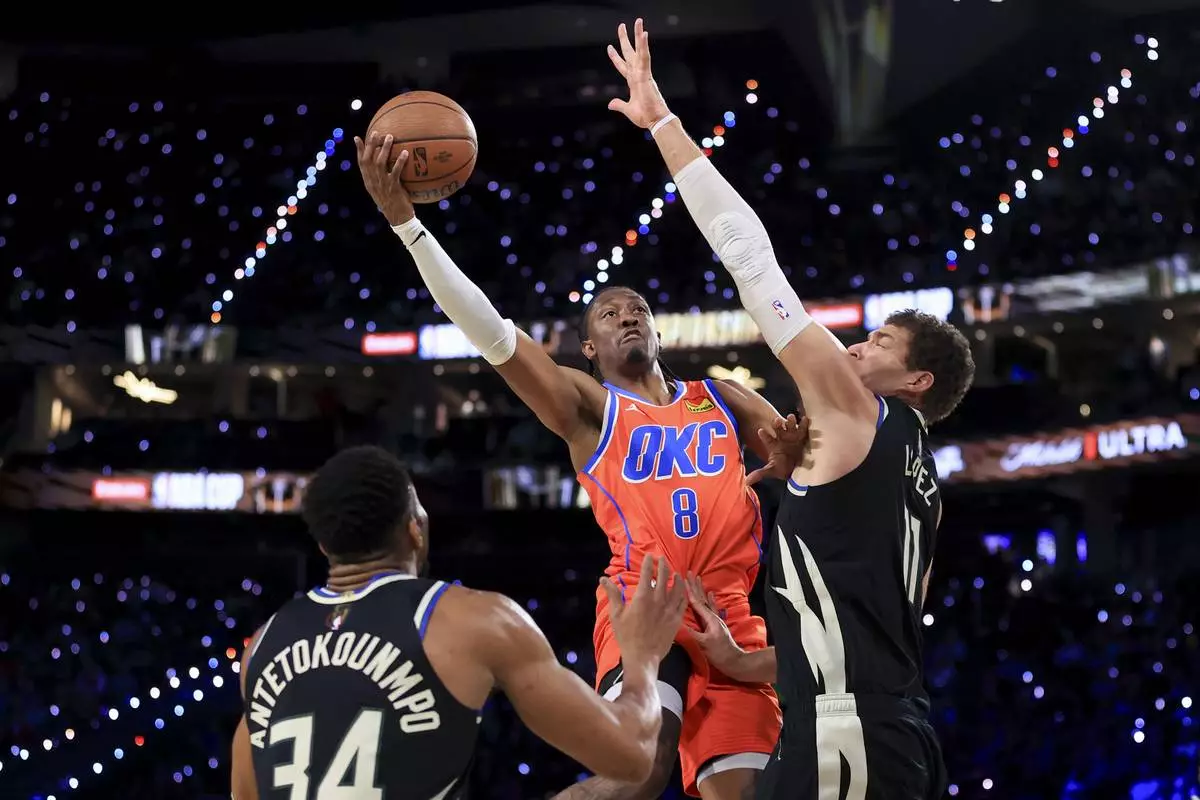
Oklahoma City Thunder forward Jalen Williams (8) shoots against Milwaukee Bucks forward Giannis Antetokounmpo (34) and center Brook Lopez (11) during the first half of the championship game in the NBA Cup basketball tournament Tuesday, Dec. 17, 2024, in Las Vegas. (AP Photo/Ian Maule)
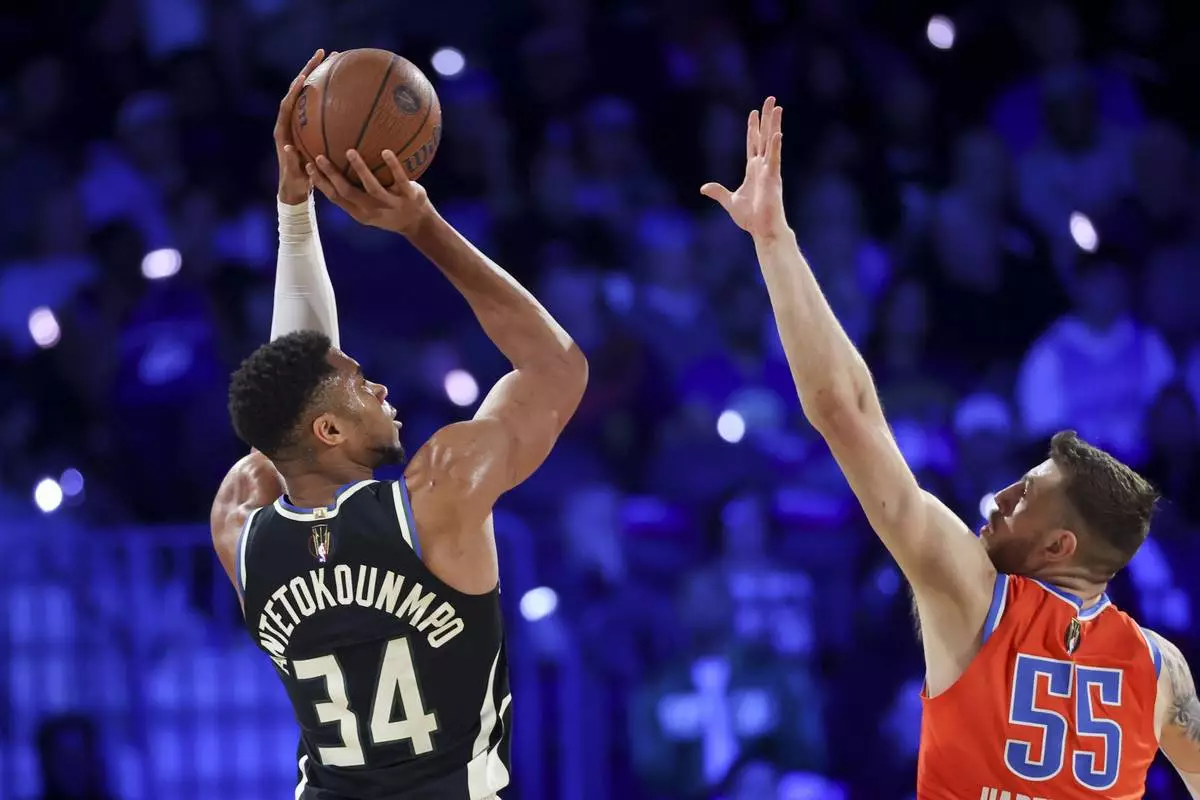
Milwaukee Bucks forward Giannis Antetokounmpo (34) shoots over Oklahoma City Thunder center Isaiah Hartenstein (55) during the first half of the championship game in the NBA Cup basketball tournament Tuesday, Dec. 17, 2024, in Las Vegas. (AP Photo/Ian Maule)
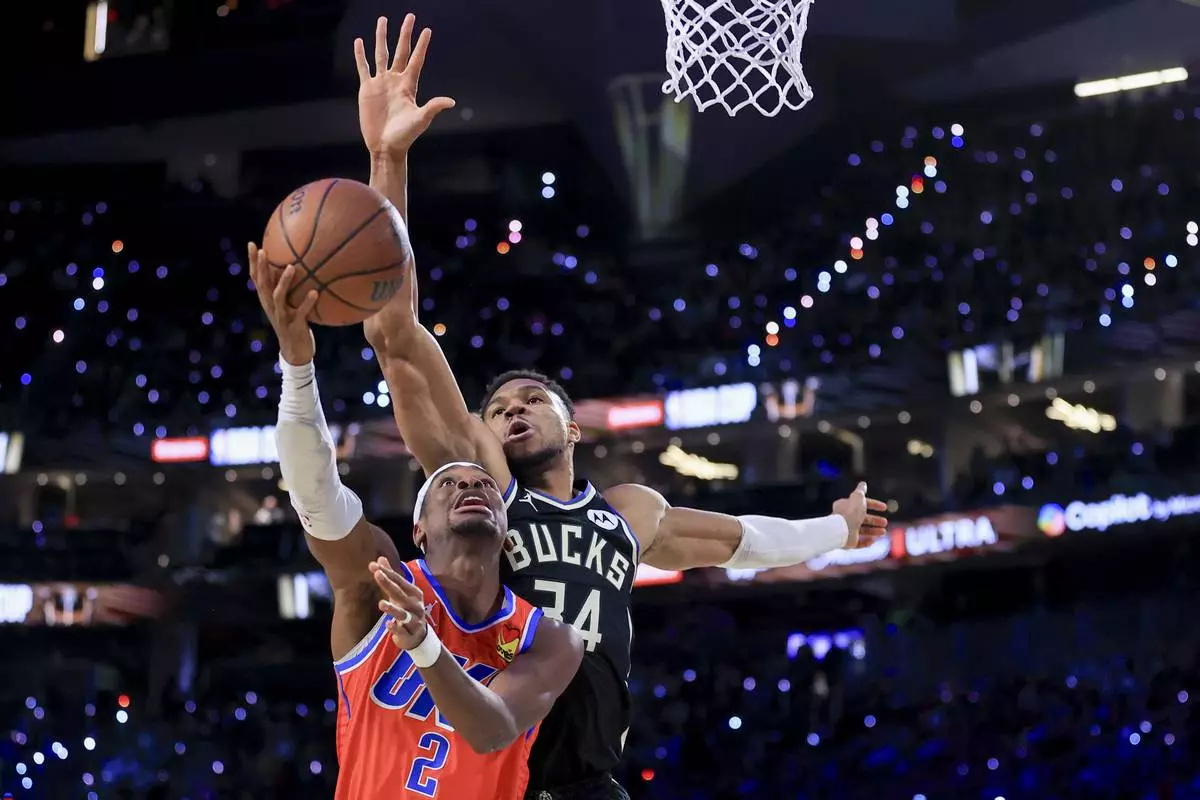
Oklahoma City Thunder guard Shai Gilgeous-Alexander (2) shoots against Milwaukee Bucks forward Giannis Antetokounmpo (34) during the first half of the championship game in the NBA Cup basketball tournament Tuesday, Dec. 17, 2024, in Las Vegas. (AP Photo/Ian Maule)
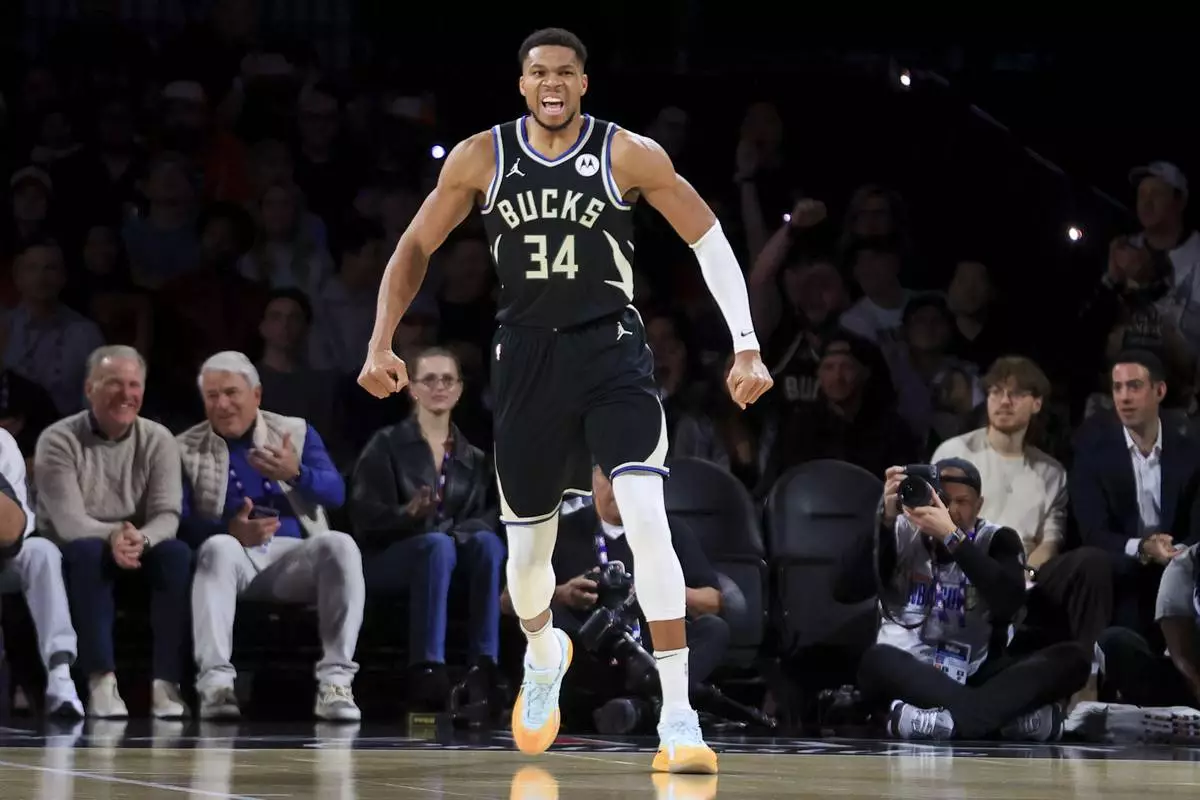
Milwaukee Bucks forward Giannis Antetokounmpo (34) celebrates after making a basket during the first half of a semifinal game against the Atlanta Hawks in the NBA Cup basketball tournament Saturday, Dec. 14, 2024, in Las Vegas. (AP Photo/Ian Maule)
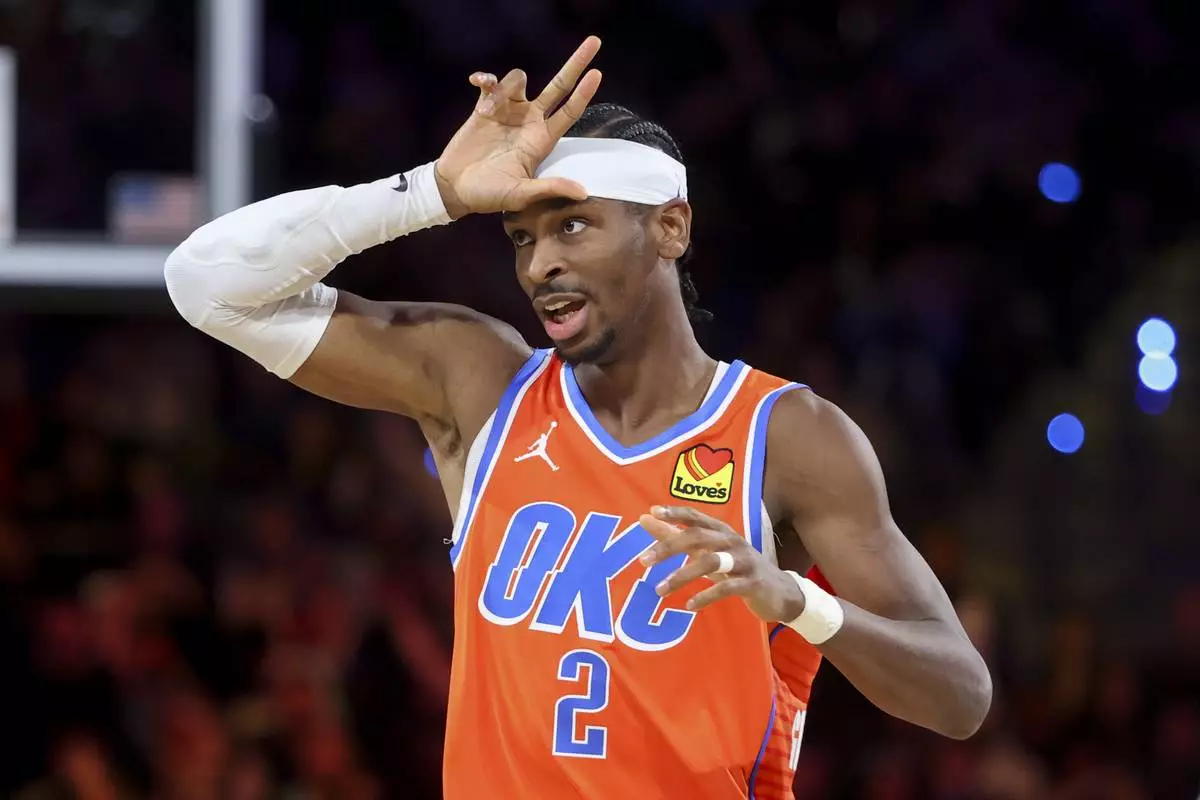
Oklahoma City Thunder guard Shai Gilgeous-Alexander celebrates during the second half of a semifinal game against the Houston Rockets in the NBA Cup basketball tournament Saturday, Dec. 14, 2024, in Las Vegas. (AP Photo/Ian Maule)
DEIR AL-BALAH, Gaza Strip (AP) — Israeli airstrikes pounded northern and southern Gaza on Wednesday, killing at least 60 people, including almost two dozen children, according to local hospitals and health officials, a day after Israeli Prime Minister Benjamin Netanyahu said there was “no way” he would halt Israel’s offensive in the Palestinian territory before Hamas is defeated.
At least 50 people, including 22 children, were killed in the strikes around Jabaliya in northern Gaza, according to local hospitals and Gaza's Health Ministry. At least ten other people were killed in the southern city of Khan Younis, the European Hospital reported.
The strikes came a day after Hamas released an Israeli-American hostage, a gesture that some thought could lay the groundwork for a ceasefire.
But Netanyahu said Tuesday he would not halt Israel's war in Gaza — even if Hamas releases its hostages — dimming hopes for a truce.
The Israeli military refused to comment on the strikes, but had warned residents of Jabaliya to evacuate late Tuesday night due to militant infrastructure in the area, including rocket launchers.
In Jabaliya, rescue workers smashed through collapsed concrete slabs using hand tools, lit only by the light of cellphone cameras, to remove bodies of some of the children who were killed.
In comments released by Netanyahu’s office Tuesday, the prime minister said Israeli forces were just days away from a promised escalation of force and would enter Gaza “with great strength to complete the mission. ... It means destroying Hamas.”
The war in Gaza began when Hamas-led militants killed 1,200 people in a 2023 intrusion into southern Israel. Israel’s retaliatory offensive has killed over 52,800 Palestinians, many of them women and children, according to Gaza’s Health Ministry, which does not say how many of the dead were combatants or civilians.
Israel’s offensive has obliterated vast swathes of Gaza’s urban landscape and displaced 90% of the population, often multiple times.
The strikes came amid hopes that Trump's visit to the Middle East could usher in a ceasefire deal or renewal of humanitarian aid to Gaza.
International food security experts issued a stern warning earlier this week that the Gaza Strip will likely fall into famine if Israel doesn’t lift its blockade and stop its military campaign.
French President Emmanuel Macron strongly denounced Netanyahu’s decision to block aid from entering Gaza as “a disgrace” that has caused a major humanitarian crisis.
“I say it forcefully, what Benjamin Netanyahu’s government is doing today is unacceptable,” Macron said Tuesday evening on TF1 national television. “There’s no medicine. We can’t get the wounded out. Doctors can’t get in. What he’s doing is a disgrace. It’s a disgrace.”
Macron, who visited injured Palestinians in El Arish hospital in Egypt last month, called for the reopening of the Gaza border to humanitarian convoys. “Then, yes, we must fight to demilitarize Hamas, free the hostages and build a political solution,” he said.
Nearly half a million Palestinians are facing possible starvation, living at “catastrophic” levels of hunger, while 1 million others can barely get enough food, according to findings by the Integrated Food Security Phase Classification, a leading international authority on the severity of hunger crises.
Israel has banned all food, shelter, medicine and any other goods from entering the Palestinian territory for the past 10 weeks, even as it carries out waves of airstrikes and ground operations.
Gaza’s population of around 2.3 million people relies almost entirely on outside aid to survive, because Israel’s 19-month-old military campaign has wiped away most capacity to produce food inside the territory.
Lidman reported from Tel Aviv, Israel. Associated Press writer Fatma Khaled contributed from Cairo and Sylvie Corbet contributed from Paris.
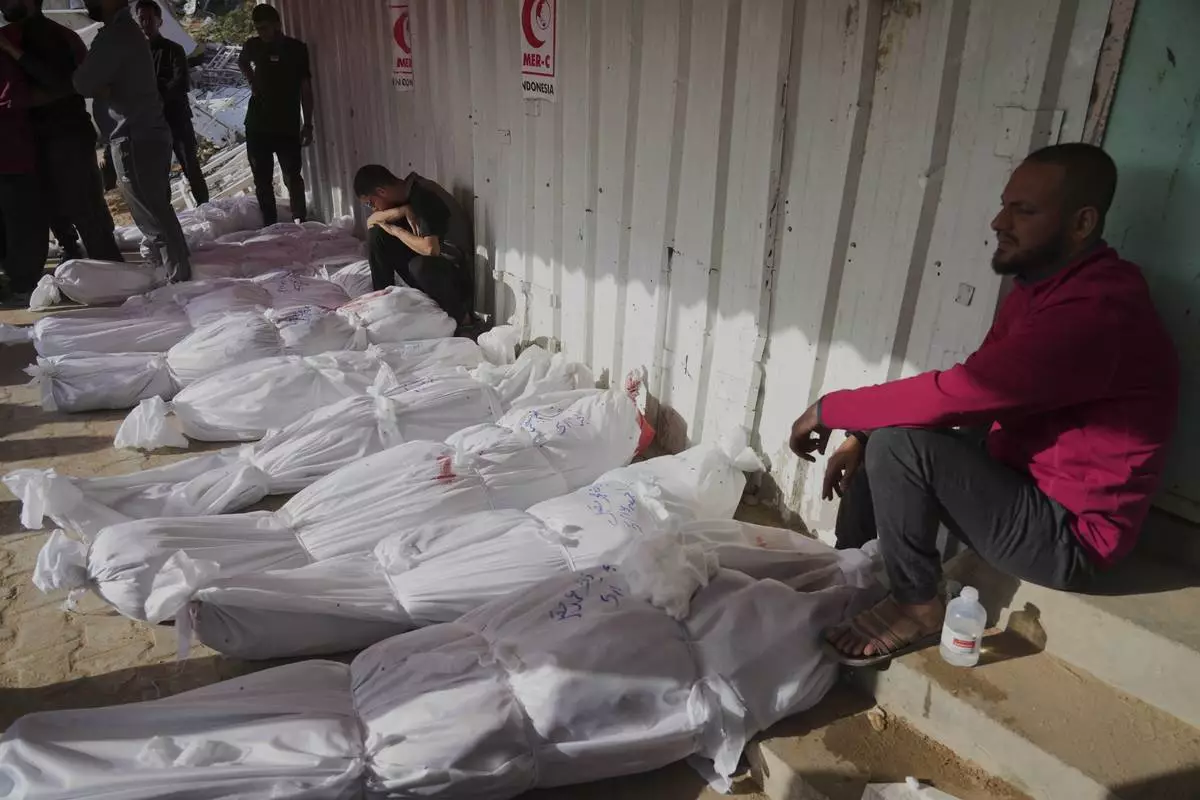
Palestinians mourn their relatives killed in an Israeli airstrikes in Jabalia, northern Gaza Strip, on Wednesday, May 14, 2025. According to local hospitals, 48 people were killed in the strikes, including 22 children. (AP Photo/Jehad Alshrafi)
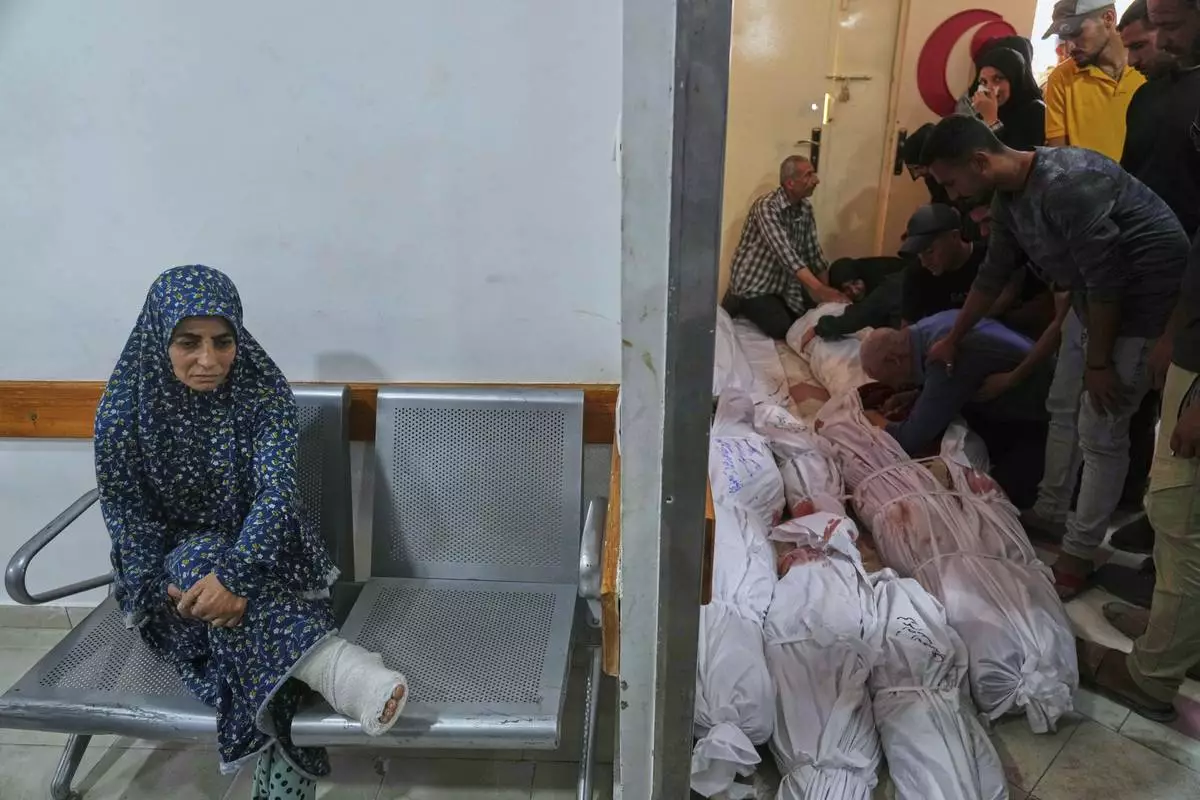
Palestinians mourn their relatives killed in an Israeli airstrikes in Jabalia, northern Gaza Strip, on Wednesday, May 14, 2025. According to local hospitals, 48 people were killed in the strikes, including 22 children. (AP Photo/Jehad Alshrafi)

Palestinians mourn children from their families who were killed in Israeli airstrikes in Jabalia, in the northern Gaza Strip, on Wednesday, May 14, 2025. According to local hospitals, the strikes killed 48 people, including 22 children. (AP Photo/Jehad Alshrafi)

Palestinians inspect the rubble of homes destroyed by Israeli airstrikes in Jabalia, northern Gaza Strip, on Wednesday, May 14, 2025. According to local hospitals, 48 people were killed in the strikes, including 22 children. (AP Photo/Jehad Alshrafi)

Palestinians mourn children from their families who were killed in Israeli airstrikes in Jabalia, in the northern Gaza Strip, on Wednesday, May 14, 2025. According to local hospitals, the strikes killed 48 people, including 22 children. (AP Photo/Jehad Alshrafi)
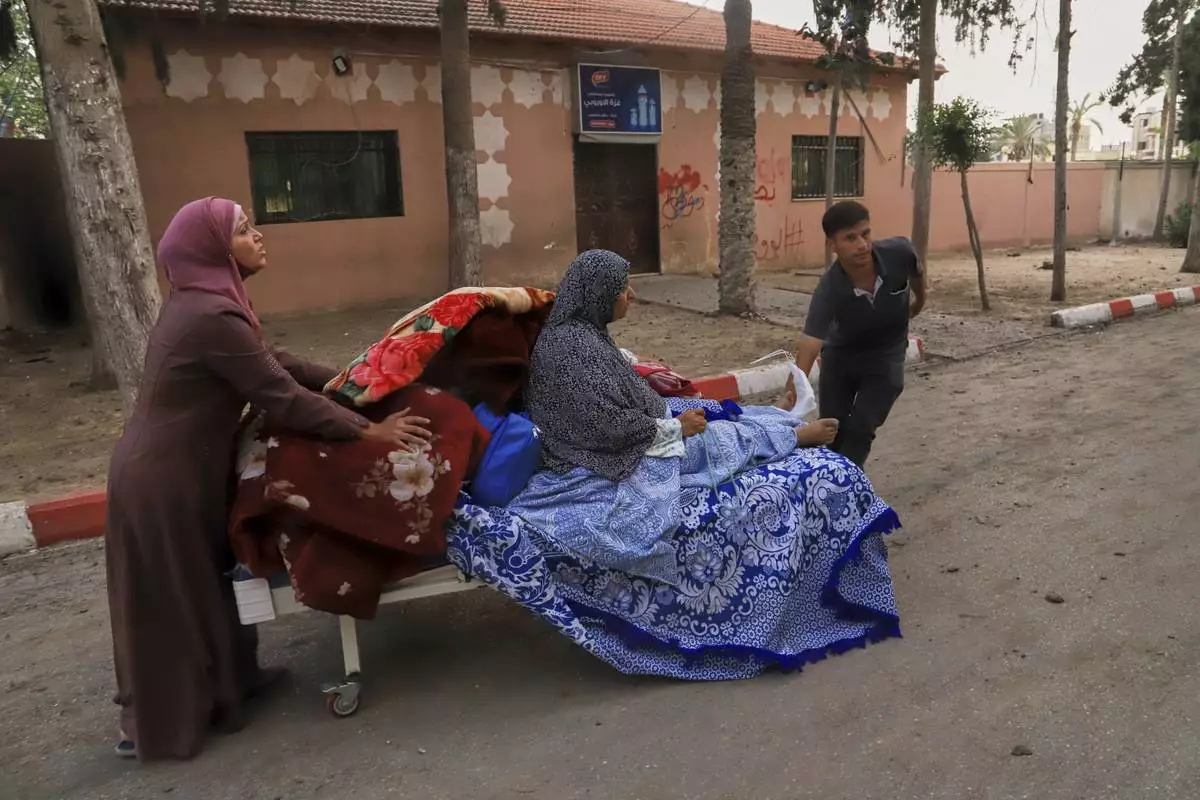
Palestinians evacuate patients from the European hospital in Khan Younis, Gaza, after it was hit by an Israeli army airstrike, Tuesday, May 13, 2025. The Israeli military said it had carried out a strike targeting what it said was a Hamas "command and control center" located beneath the hospital. (AP Photo/Mariam Dagga)






















